Uncategorized
Our 2022-23 Discussion Group Leaders
October 1, 2022Rev. Dr. Yolanda Davis
Our discussion group leaders are anchored by our longtime friend, Rev. Dr. Yolanda Davis. Rev. Dr. Yolanda has supported our work with her brilliance and compassion for youth since 2006, when my wife and I began serving as Education Ministry Leaders at the Turner Chapel AME Church (Marietta, GA).
Rev. Dr. Yolanda is the only discussion group leader to spend 2 years with the same students (10th and 11th grades). She challenges students to think critically, reflect deeply, and to engage in discussions in the manner that will be expected of them as college students.
Peyton Wilson (Graduate, George Washington University)
I was a member of the CPC at Turner Chapel AME where I volunteered with my sister, Raigon. At a young age, my church community and family made very clear the significance of a college education and a strong work ethic. Due to the firm and compassionate guidance from Mr. and Mrs. Wynn, I was awarded the Posse scholarship to George Washington University. There, I was a Resident Advisor, a campus tour guide, Executive Vice President of our Black Student Union, Creative and Executive Editor of our campus’ Black magazine The Black Ace, a leader within the Posse cohort, and held several campus jobs and research positions.I decided to volunteer with the College Planning Cohort because I am a testament firsthand to what the program can do for students. Even after I graduated from high school, the work ethic and dedication I developed from middle school were key to my success in undergrad. I want to help cultivate the same skills in students who enter the program. I had the pleasure of working with stellar 11th grade students last year, and this year I will be working with our 8th grade students.
Jocelyne L.
I am volunteering because I have been in the College Planning Cohort since 6th grade and I’ve been wanting to help others with their processes as well. Along with the idea of giving general advice, I’d like to share my knowledge regarding the transition to high school, the opportunities and activities available at school, ways to sharpen your transcript while also looking back on things that I could’ve done better. I’m hoping that I can give my discussion group a place and community to be able to talk about their plans, school life, and feel comfortable the way that I was when I was in a discussion group.With these 8th graders, I am looking forward to helping them identify their strengths, interests, and goals. When I was in their shoes there were many subject areas I could see myself in, but most of them were connected to where I was performing well in school. I want to help our students identify their strengths and passions outside of the classroom, and develop a plan to get them in the mindset for personal success.
Griffin S.
I started the Cohort program the summer before 8th grade in the College Planning Bootcamp, followed by the PCS Cohort in 8th grade. This past summer I served as an intern for middle school students in the College Planning Bootcamp and decided to accept the challenge this year to serve as the discussion group leader for the new middle school Emerging Leaders Program.I am volunteering partially due to the recommendation of my mentors: Mr. and Mrs. Wynn, and to challenge myself by stepping outside of my comfort zone, and because I thought that this would be a good leadership growth opportunity.As discussion group facilitator I hope to guide the students’ discussions in a meaningful way, and watch the students become more confident in themselves as I did when I first started the Cohort. I am hoping that the students can learn from each other and benefit from the interactions in this discussion group of motivated and talented students.
Posts by Mr. Wynn
May 30, 2022Monday, May 30, 2022
Hi, I am Mychal Wynn. I have written a college planning curriculum and I provide college planning guidance to students in our national program and through our school district and community partners. I thought that I might share some posts, and thoughts, regarding some of the misinformation regarding college planning.
Military Scholarships
I recently saw a Facebook post of a student, who graduated as her high school’s valedictorian, standing alongside an Army recruiter holding up a check that read, ‘$160,000 Military Scholarship.’ While the amount is impressive, context is important. The military does not offer a $160,000 college scholarship. So what does the check really represent? Does the check represent the value of the student’s enlistment signing bonus, and the value of future military benefits after she completes her military service contract? Does the check represent the projected value of the G.I. Bill after the student fulfills her military service contract? Was the student aware that she could have pursued admission at a Military Service Academy and received a free education, commissioned as an officer, and entered the military with a higher MOS? Was the student aware that she could have pursued a campus-based ROTC Scholarship, received a near-full to full scholarship based on the college to which she chose to enroll, commissioned as an officer, and entered the military with a higher MOS? Context is everything.
College Planning Cohort, a program sponsored by the Foundation for Ensuring Access and Equity | www.accessandequity.org | (678) 395-5825 | P.O. Box 70457 | Marietta, GA 30007.
Why so many students (and parents) are lost
In April each year, we receive inquiries from parents and students, AFTER, they receive financial aid award letters. The inquiries all have the same tone, ‘I got into college and I want to know where I can get scholarship money.’
Unfortunately, we cannot support this backwards approach, i.e., get into college first and then look for scholarships.
High school juniors participating in our program, engaged in thoughtful, thorough, and intentional college and scholarship research in March (see the slides). They identified the colleges to which they should apply and the scholarships for which they should pursue. All of this was done within the context of their ‘Body of Work.’ Consequently, rather than throwing darts at a proverbial college and scholarship dartboard, hoping for the best, they will be applying to a strategically identified group of colleges and for a strategically identified group of scholarships to which they best match.
While high school seniors entering our program via our college planning boot camp will be behind those students who participated in our program as high school juniors, they will be ahead of the millions of students and parents who will circle back around in April of 2023 asking where they can get scholarships.
College Planning Cohort, a program sponsored by the Foundation for Ensuring Access and Equity | www.accessandequity.org | (678) 395-5825 | P.O. Box 70457 | Marietta, GA 30007.
Sandwiched in between these three slides are:
- The types of colleges to which this student plans to apply, i.e., research universities, liberal arts colleges, HBCUs, etc., based on the student’s financial need and career aspirations.
- 19 merit-based scholarships for which this student plans to apply.
- 11 colleges offering full need-based institutional scholarships for which this student is a good match.
- 2 last dollar scholarship programs for which this student is a good match.
- A premier scholarship program for which this student is a good match and for which their partner colleges have specific application deadlines for consideration.
All of this “College Planning” occurred during March of the student’s junior year of high school.
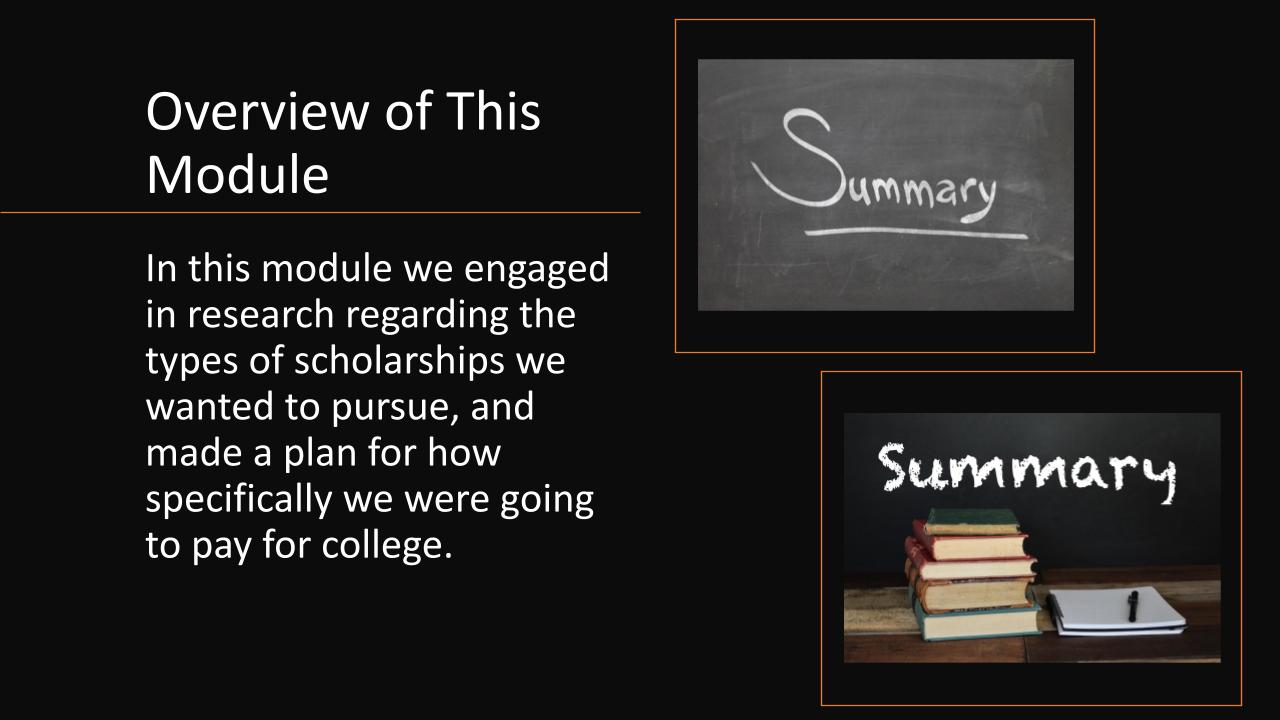
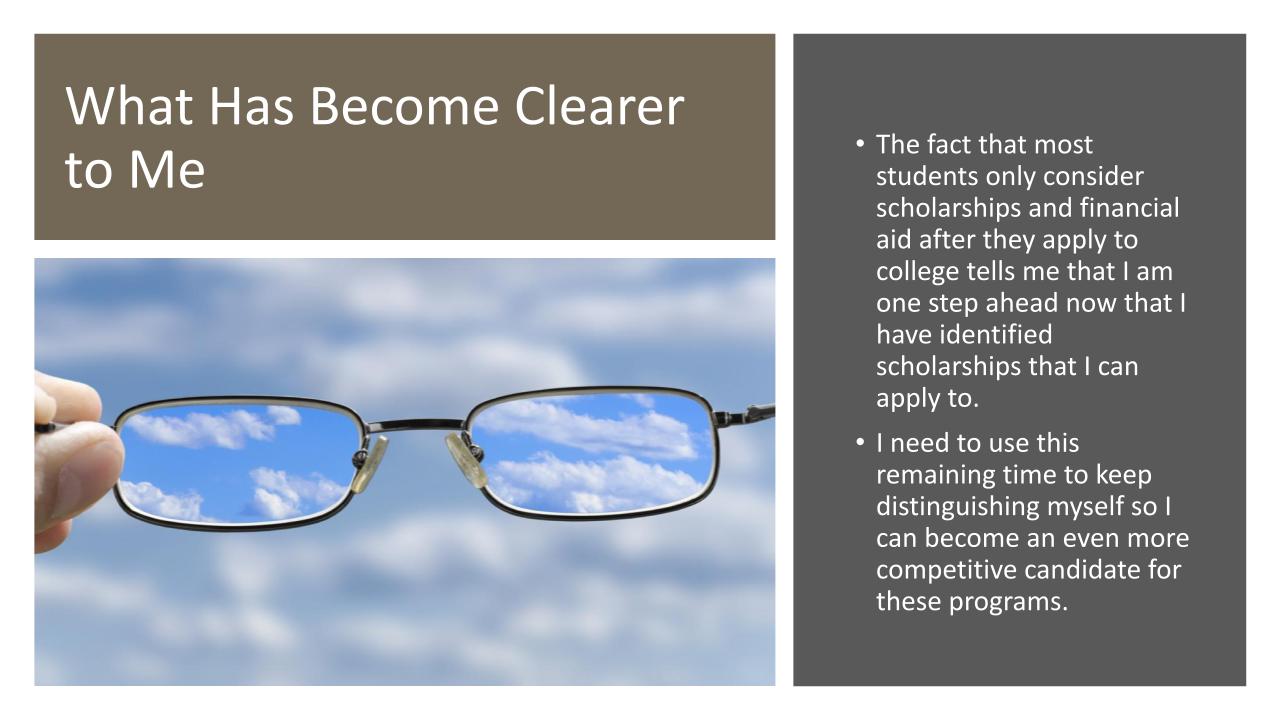
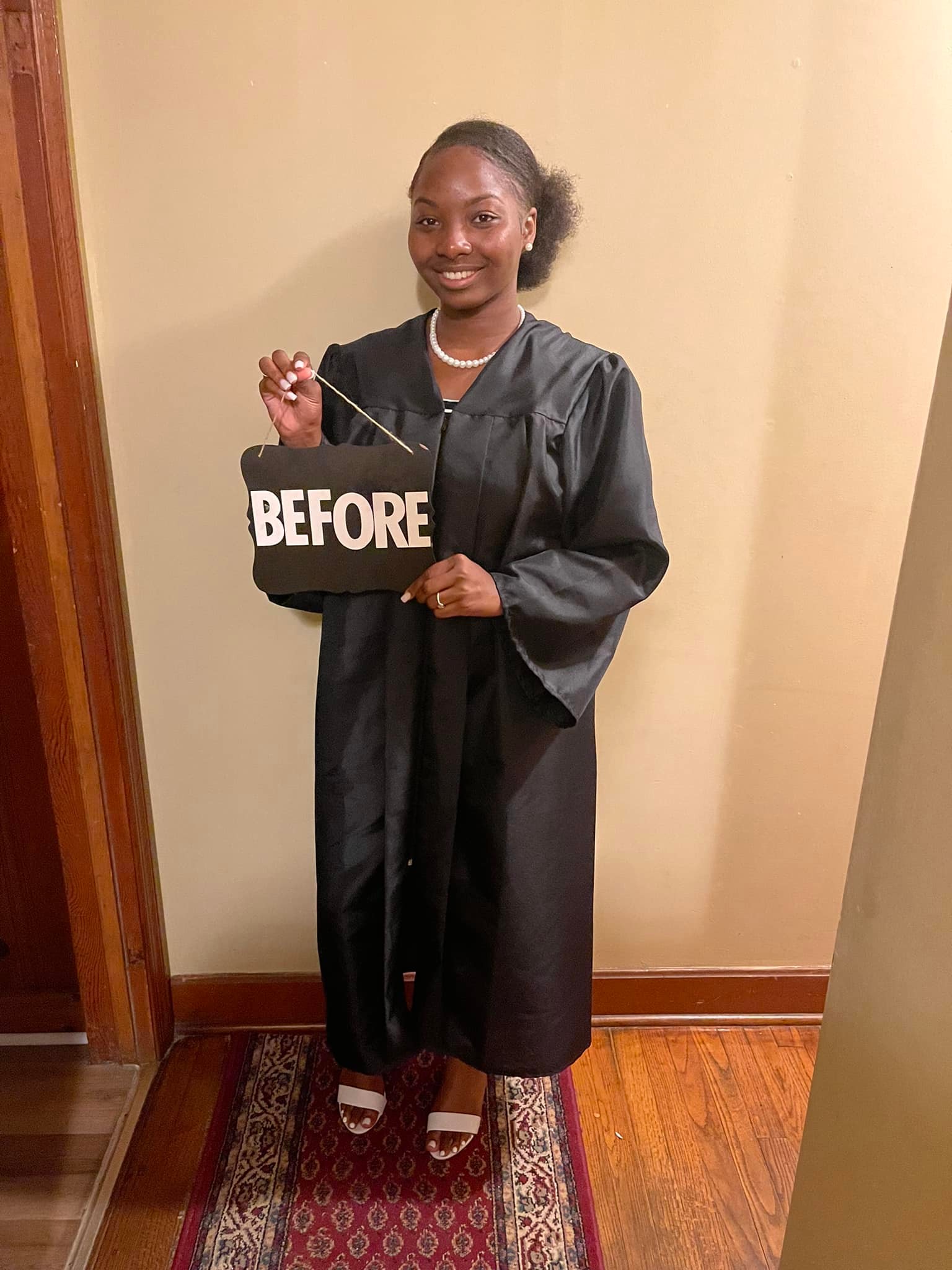
Envision what you will look like at your commencement
One of the early conversations that we have with students as they enter our program is for them to envision what they want to look like at their commencement (high school or college), i.e., what cords, hoods, pins, medals, and awards do you want to receive?
Hannah McFadden, from our Florence School District 3 Cohort Class of 2022, provides wonderful before and after photos as a high school student and Kristen Starks, from our Guilford County Schools Cohort Class of 2018, provides an example of a highly decorated college graduate.
College Planning Cohort, a program sponsored by the Foundation for Ensuring Access and Equity | www.accessandequity.org | (678) 395-5825 | P.O. Box 70457 | Marietta, GA 30007.
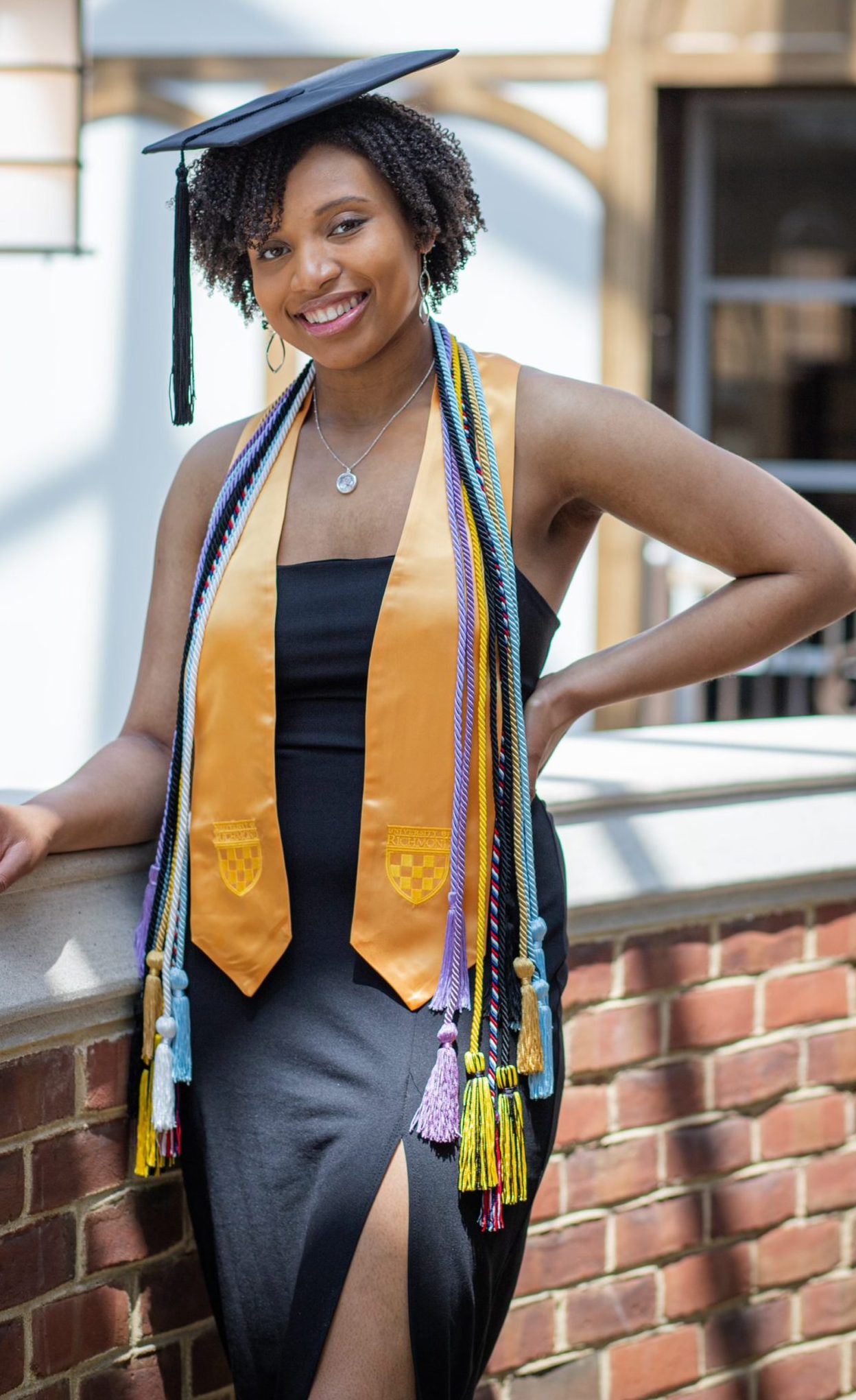
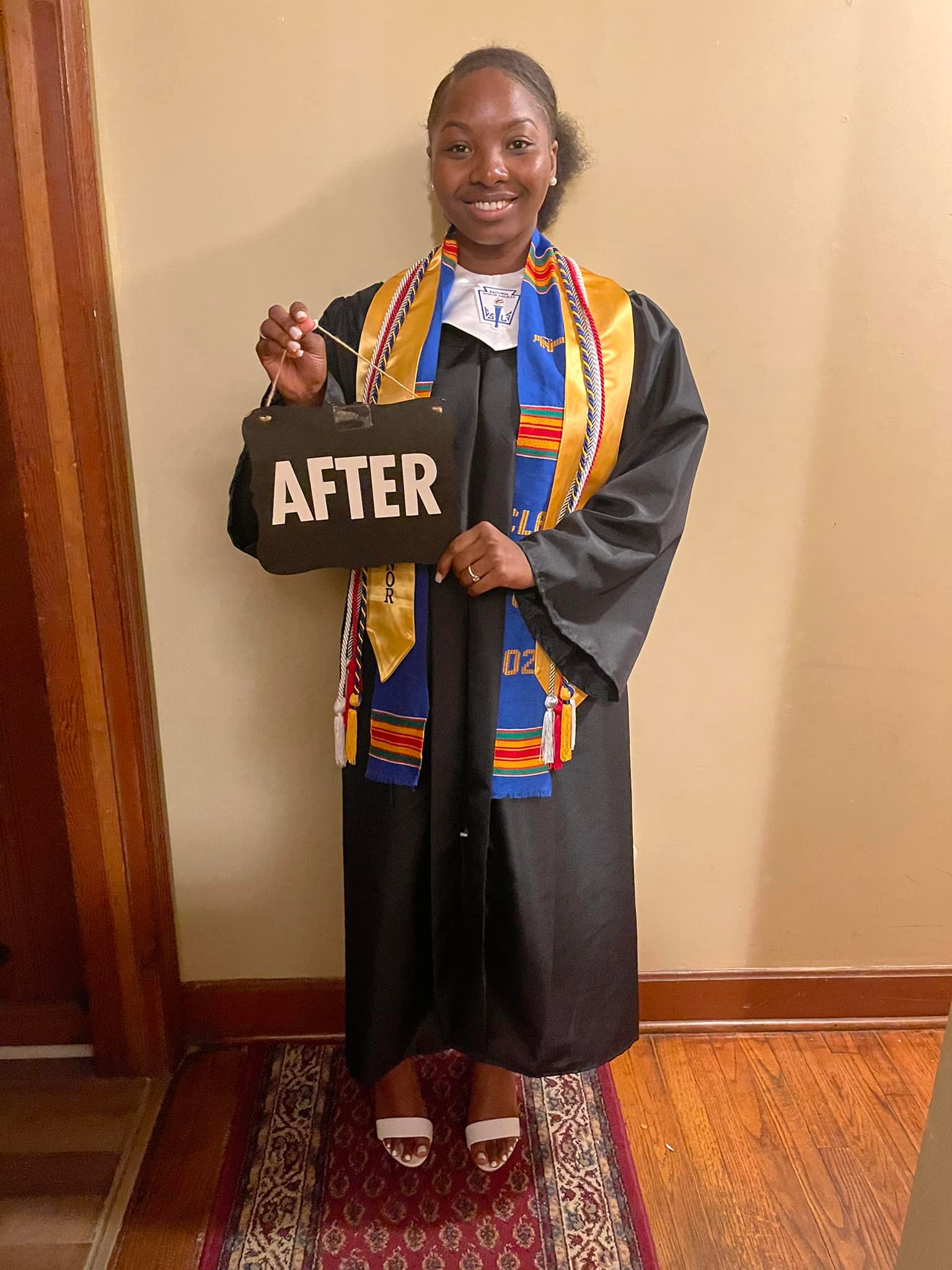

Tuesday, May 31, 2022
The latest headline from New York noted, ‘Free College Program Falls Short For Low-Income Students.’ (https://www.cnbc.com/2022/05/27/new-york-made-4-years-of-college-free-heres-how-its-going.html). The initiative, like others throughout the country, is near-sighted and poorly conceived. The program was created without providing an onramp for the students the program is designed to reach—low income students. This should have come as no surprised to the policy makers in New York as the state’s FAFSA completion rate is only 56 percent.
If programs are going to be developed specifically to assist students from low-income families with greater access to college and careers, then the programs must be undergirded by support programs that are effective in reaching the desired populations and getting students in the door. Clearly the people who create the programs do not understand, or have a relationship with the people the programs are supposed to help.
Church helps students strike gold on scholarship search
May 28, 2014Wednesday, May 28, 2014
By Eric Stirgus – The Atlanta Journal-Constitution
The $3,000 their church raised for the college scholarships was nice, but Mychal and Nina Wynn thought it could do more.
In 2007, the couple approached Turner Chapel AME Church senior pastor, the Rev. Kenneth Marcus, with the idea of a ministry to help students search for other scholarships and, just as importantly, provide them with the skills to get those scholarships.
 Some of the 2014 graduates who attend Turner Chapel AME Church stand at the altar during the service Sunday.
Some of the 2014 graduates who attend Turner Chapel AME Church stand at the altar during the service Sunday.
On Sunday the church, in Marietta, held a service for 50 church members who have been awarded scholarships. The offers totaled $4.3 million.
Some students, like Brittany White, have earned full scholarships. White earned a Gates Millennium scholarship, which pays the entire tuition to any school the recipient attends. White’s choice was Spelman College.
 “It feels really great knowing they want me to succeed as much as I want to succeed,” said White, 18.
“It feels really great knowing they want me to succeed as much as I want to succeed,” said White, 18.
Most of the students attend high schools in Cobb and Marietta, but some have graduated from schools in Cherokee, Fulton, Gwinnett, Paulding counties and Atlanta.
Community organizations and houses of worship across Georgia are getting more involved in helping aspiring college students find scholarships. Few, though, are as involved or successful as Turner Chapel AME, observers say.
Dr. Emily Lembeck, superintendent of Marietta City Schools, said, “I always enjoy attending this special service at Turner Chapel, where the number of graduates recognized continues to grow each year. This year MHS had a record number of graduates earning the largest amount of scholarship funds ever and I appreciate the contribution to this success that stems from the support some of our students received from the Education Ministry.”
At Turner Chapel AME, the Wynns, youth pastor Rev. Don Ezell and others worked with student members to find scholarships that fit their academic interests. They also helped with resume and essay writing, tutoring and preparing for the Criterion-Referenced Competency Test. The church also holds a college fair each October. Last year, about 50 colleges came, said Mychal Wynn.
Reginald Lyon, president of the Duke Black Alumni Connection, which has about 1,500 members nationwide, attended the fair and was astounded by the preparedness of the students and workshops the church had on financial aid, college interviews and other topics.
“This was the most impressive setup I’ve seen at a historically black church,” said Lyon, who lives in Dallas, Texas. The church began in the mid 19th century. It has about 6,000 members.
Like Jesus urging his disciples to follow him and vowing to make them fishers of men, the Wynns have travelled to other churches to share what they are doing at Turner Chapel AME, with the inspirational message that they can do it too.
“We have created a scholarly culture and a culture of service,” said Mychal Wynn. That culture of service includes requiring church members in college to return on their breaks to help other students, or to mentor other Turner Chapel AME students once they arrive on campus. Many students are the first in their family to attend college and were unaware many of these scholarships exist. Some students say their guidance counselors, swamped with the hundreds of students seeking their attention, don’t always have time to help.
Linette Andrea, whose daughter, Jordan Fessehaie, 17, will attend Boston University this fall, echoes the thoughts of many parents. A blessing, mom called it.
 “Jordan had a clear vision of her goals since the tenth grade and working with the Wynns allowed both of us to be more focused and acquire information that was not at school or in the community,” Andrea said.
“Jordan had a clear vision of her goals since the tenth grade and working with the Wynns allowed both of us to be more focused and acquire information that was not at school or in the community,” Andrea said.
For Kyla Baron, 17, the long hours of prep work in the ministry have resulted in a full scholarship from Xavier University in New Orleans, where she wants to study biology. Baron, who graduated from Kennesaw Mountain High School, said she’s received other scholarships that will help her pay for books, her dorm room and transportation to school “so my parents don’t have to pay for that.”
Click here to listen to student testimonials from their participation in the church’s 2014 College Planning Cohort: